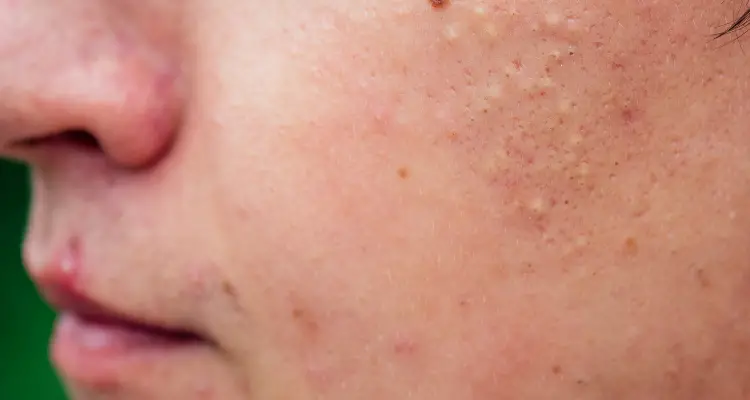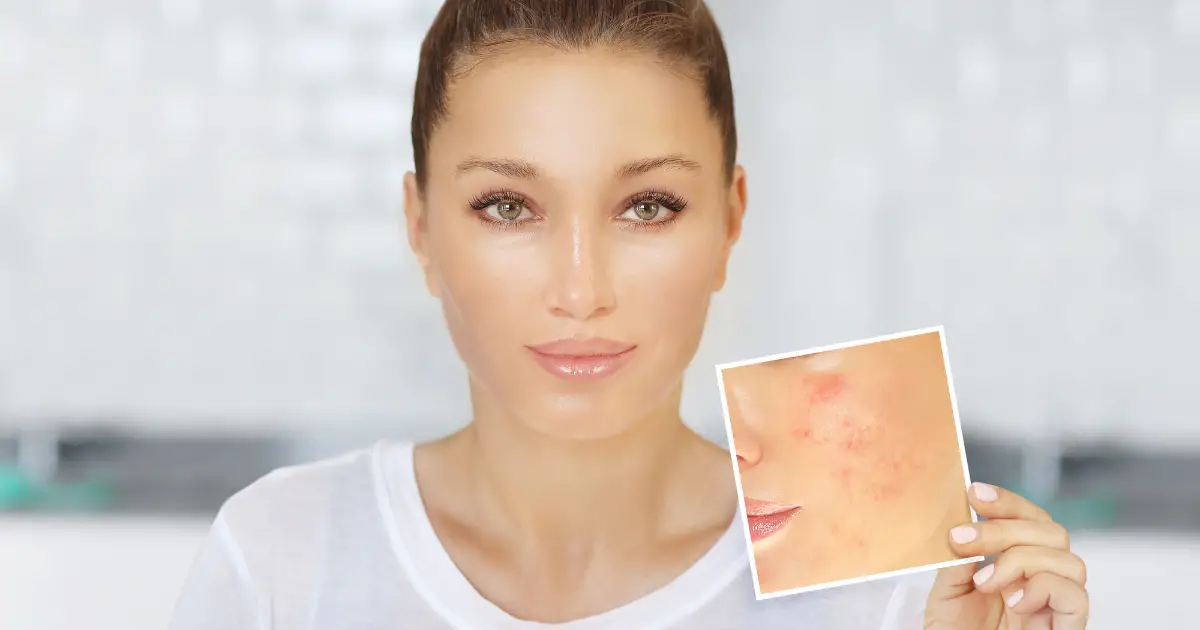To treat cystic acne naturally, you can try using topical remedies and making lifestyle changes. Incorporating tea tree oil and aloe Vera into your skincare routine can help reduce inflammation, while maintaining a balanced diet and managing stress levels can also improve your skin’s condition.
Additionally, avoid squeezing or picking at the acne, as this can worsen the inflammation and cause scarring.

Understanding Cystic Acne
Cystic acne is a severe form of acne that develops deep within the skin. It is characterized by large, painful cysts that can leave behind scars. Understanding cystic acne is important in order to effectively treat it. Cystic acne occurs when the pores in the skin become clogged with oil and dead skin cells.
Hormonal imbalances, genetics, and certain medications can contribute to its development. It is important to differentiate cystic acne from other types of acne, such as whiteheads or blackheads. Cystic acne typically requires more aggressive treatment options, including prescription medications and skincare routines.
Natural remedies, such as tea tree oil and aloe Vera, may also help alleviate symptoms. By implementing a holistic approach to skincare and addressing the underlying causes, cystic acne can be managed effectively.
Natural Remedies For Cystic Acne
Cystic acne can be treated naturally through various remedies. One effective approach is maintaining a healthy skincare routine. This involves cleansing the face daily, using non-comedogenic products, and avoiding harsh chemicals. Another important aspect is incorporating a balanced diet full of fruits, vegetables, and antioxidants, as it helps reduce inflammation in the skin.
Hydration is also crucial for healthy skin, so drinking plenty of water is recommended. Moreover, effective stress management techniques play a significant role in treating cystic acne. Engaging in activities like meditation, exercise, and deep breathing can help manage stress levels.
It’s important to note that these natural remedies may take time to show results, so consistency is key. By following these guidelines, you can naturally treat cystic acne and achieve clear, healthy skin.
Herbal Treatments For Cystic Acne
Cystic acne can be treated naturally using herbal remedies. One effective option is tea tree oil, which helps reduce inflammation. Another option is aloe Vera gel, which soothes and heals the skin. Additionally, green tea can be used due to its antioxidant properties, which promote overall skin health.
These natural treatments are not only effective but also safe to use. They provide a gentle yet powerful solution for dealing with the stubborn and painful cystic acne. By incorporating these herbal remedies into your skincare routine, you can effectively alleviate the symptoms of cystic acne and achieve clearer and healthier skin.
Lifestyle Changes To Prevent Cystic Acne
Treating cystic acne naturally involves making lifestyle changes. One important change is avoiding excessive use of makeup and heavy skincare products. These products can clog pores and contribute to acne breakouts. It is also essential to regularly clean your pillowcases and sheets to prevent the accumulation of bacteria and oil.
Another crucial step is managing hormonal imbalances through exercise and proper nutrition. Engaging in physical activity helps regulate hormones and reduces the risk of acne flare-ups. Additionally, consuming a balanced diet rich in fruits, vegetables, and antioxidants promotes healthy skin.
By implementing these lifestyle changes, you can effectively prevent and manage cystic acne without relying on harsh chemicals or medication.
The Role Of Diet In Treating Cystic Acne
Diet plays a crucial role in the treatment of cystic acne. Certain foods can worsen acne breakouts, so it’s important to avoid them. Additionally, incorporating nutritional supplements that promote clear skin can be beneficial. These supplements provide the body with essential vitamins and minerals to help maintain healthy skin.
Anti-inflammatory foods are also essential for reducing cystic acne. They help reduce inflammation in the body, which can contribute to acne. Consuming foods rich in antioxidants and omega-3 fatty acids can help combat inflammation. In conclusion, by following a diet that excludes acne-triggering foods and includes skin-nourishing supplements and anti-inflammatory foods, one can naturally treat cystic acne.
Gentle Skincare Products For Cystic Acne
Cystic acne can be treated naturally with gentle skincare products. Use non-comedogenic cleansers and moisturizers to avoid clogging pores. Calm and detoxify the skin with natural face masks. Unclog pores by trying a diy facial steaming method. These simple steps can effectively treat cystic acne without harsh chemicals.
Soothe your skin and improve its condition in a natural and gentle way. Take care of your skin with these easy-to-follow tips for a healthier complexion. Give your skin the care it deserves and say goodbye to cystic acne naturally.
Understanding Prescription Treatments For Cystic Acne
Prescription treatments for cystic acne play a significant role, especially when natural remedies fall short. These medications commonly include topical creams or gels, oral antibiotics, retinoids, and birth control pills for women. It’s important to note that these treatments may have side effects.
For instance, antibiotic use can lead to antibiotic resistance and may cause stomach upset or yeast infections. Similarly, retinoids may cause dryness, redness, and sensitivity to the sun. Therefore, it is essential to consult a dermatologist, who will evaluate your specific condition and guide you on the appropriate treatment.
They will also provide precautions and advise on how to manage potential side effects. Keeping a systematic approach can help effectively manage cystic acne and achieve clearer, healthier skin.
Seeking Professional Help For Cystic Acne
Seeking professional help for cystic acne is essential in order to find effective treatment options. A dermatologist can provide personalized advice based on your specific skin condition and its severity. They may recommend professional acne treatments such as chemical peels or laser therapy to target deep-rooted acne.
Additionally, integrating their skincare recommendations into your routine can help improve your skin’s overall health. By adhering to their expert advice, you can take proactive steps towards treating cystic acne naturally. Remember, a dermatologist’s guidance is crucial in order to address the underlying causes of your acne and develop a tailored treatment plan.
Don’t hesitate to seek professional help and regain control over your skin.
Maintaining A Long-Term Skincare Routine
Maintaining a long-term skincare routine is crucial in treating cystic acne naturally. Consistency and patience are key factors throughout the treatment process. To prevent future breakouts, it is important to make adjustments to your skincare routine as per your skin’s changing needs.
Frequently Asked Questions
What Are The Common Causes Of Cystic Acne?
Cystic acne is usually caused by hormonal imbalance, excess oil production, and the presence of bacteria on the skin.
Can Diet Affect Cystic Acne?
Yes, diet can play a role in cystic acne. Consuming high-glycemic foods and dairy products can trigger breakouts in some individuals.
Are There Any Home Remedies For Treating Cystic Acne?
Home remedies like applying tea tree oil, using honey masks, and gentle exfoliation can help reduce inflammation and promote healing of cystic acne.
How Can I Prevent Cystic Acne?
To prevent cystic acne, maintain a regular skincare routine, avoid touching or picking at your face, and make sure to remove makeup before bed.
How Long Does It Take For Cystic Acne To Heal?
The healing time for cystic acne can vary. While some breakouts can clear up within a few weeks, others may take several months to fully heal. Patience and consistent treatment are key.
Final Words
Tackling cystic acne naturally requires a comprehensive approach that targets the root causes of this stubborn skin condition. By maintaining a healthy diet, avoiding triggers, implementing a consistent skincare routine, and incorporating natural remedies, you can effectively reduce inflammation and promote healing.
Consistently practicing good hygiene habits, such as regularly washing your face and keeping your hands off your face, can also prevent further breakouts. Furthermore, managing stress levels and getting enough sleep will support overall skin health. Remember, each individual’s skin is unique, so finding the right combination of natural treatments may require some trial and error.
Being patient and persistent in your efforts will ultimately lead to clearer, healthier skin. By following these tips, you can take control of your cystic acne and achieve the clear complexion you’ve always wanted.

